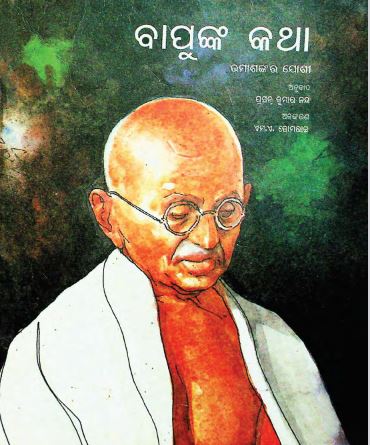Bapunka Katha,” translated by Prasanna Kumar Nanda from the original work by Uma Sankar Josi, is a captivating Odia book published in 2003 by the National Book Trust (NBT). The book offers an intriguing collection of anecdotes centered around the life and philosophy of Mahatma Gandhi, affectionately known as Bapuji. It is a compelling read that delves deep into the moral and ethical principles that shaped Gandhi’s life and his impactful role in India’s freedom movement.
“Bapunka Katha” stands out for its evocative storytelling, each anecdote acting as a vignette that brings key moments from Gandhi’s life into sharp focus. Uma Sankar Josi’s original narratives translate seamlessly under Nanda’s skillful hand, ensuring that the essence of Gandhi’s teachings is preserved while making them accessible to the Odia-speaking audience. The translation does an admirable job of retaining the simplicity and directness that were hallmarks of Gandhi’s own communication style.
One of the major themes running through the book is the exploration of Gandhi’s adolescent years. These formative years were crucial in shaping his character and values. The anecdotes from Gandhi’s youth serve as vital lessons in ethics, resilience, and the pursuit of truth (Satya). For example, readers are treated to the story of a young Gandhi’s commitment to telling the truth, even when it placed him at a disadvantage. His trials and tribulations as an adolescent are portrayed with remarkable sensitivity, shedding light on the internal and external struggles he faced.
Another powerful aspect of “Bapunka Katha” is its ability to humanize a figure often elevated to the status of a saint. Through the use of everyday anecdotes, the book demystifies Gandhi, presenting him as a relatable figure whose wisdom and virtues were hard-earned through personal experience and introspection. Stories like his experiments with diet, his efforts to conquer fear, and his relentless pursuit of self-improvement provide valuable insights into the man behind the legend.
Nanda’s translation manages to capture the local flavor and idiomatic nuances of the Odia language, making the book resonate deeply with its target audience. The anecdotes are succinct yet potent, often concluding with a moral lesson or an insightful reflection that encourages readers to apply Gandhi’s teachings in their own lives.
Published by the National Book Trust, “Bapunka Katha” also shines as part of NBT’s mission to make powerful literary works accessible to a wider audience. The organization’s commitment to promoting reading culture and preserving literary heritage is evident in the high-quality production and thoughtful presentation of the book. The cover art, layout, and typography are all designed to appeal to readers of various ages, from young adolescents experiencing Gandhian philosophy for the first time, to older readers revisiting or deepening their understanding of Gandhi’s teachings.
In conclusion, “Bapunka Katha” by Uma Sankar Josi, translated into Odia by Prasanna Kumar Nanda, is more than just a collection of stories about Mahatma Gandhi. It is a portal to understanding Gandhi’s multidimensional personality, an educational resource that instills moral values, and a cultural artifact that enriches the literary heritage of Odia literature. Through its engaging anecdotes, it inspires readers to reflect on their own lives and consider how the virtues of truth, non-violence, and self-discipline can be integrated into their daily practices.
Books Info
| Books name | Bedabandita Saraswati O Saraswata Sabhyata |
| Editor | Uma Sankar Josi; Prasanna Kumar Nanda, Tr. |
| No Of pages | 31 |
| Publisher | National Book Trust India |
| Publication | 2003 |
| Printed At | NA |
| Distributor | NA |

